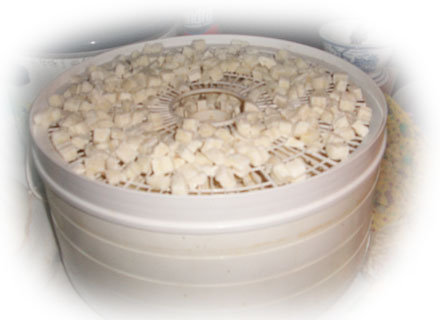Dehydrating Potatoes

Dehydrating potatoes is an excellent way to add to your emergency food storage if your goal is to create and build a well-rounded emergency food store, as potatoes are useful in a number of different types of recipes. By nature, dehydrating your own foods can sometimes be time consuming, however with a few easy tips and a bit of luck, you will be stocking your pantry with homemade dried potatoes in no time at all.
What Kind of Potatoes are Best for Dehydrating?
The answer to this question is quite simple. Any type of potato that you would enjoy in its normal state are easy to dehydrate if you have the time to do it. Whether you enjoy russet potatoes, Irish potatoes or even sweet potatoes –it does not matter, all of them can be prepared for long-term storage.
Dehydrating Potatoes – A Brief Guide
Dehydrating potatoes for long-term storage is relatively simple. Follow these simple instructions to start filling up your pantry in no time.
Step 1:
The first thing you will need to do is thoroughly wash your potatoes to remove dirt, critters and bacteria. Once washed, cut any bad spots off of your potatoes. You will also want to use a fork to stab each potato several times to prevent them from exploding in the oven.
Step 2:
Place your potatoes directly on your oven racks, remembering to space them as equally as possible. Close your oven and bake for 30 minutes at 400 degrees. Your result should be a batch cooked but still firm potatoes.
Step 3:
At this point, remove the potatoes from the oven and place them someplace where they can completely cool. The cooling process is imperative in drying potatoes because as they naturally lower their temperature, the sugars contained within are structurally changed into more resistant starches – meaning that by allowing them to cool naturally you are aiding in the preservation of the nutrients it contains.
Step 4:
When your potatoes are cool, remove the peels. If you have baked and cooled them correctly, the peels should come off clean without so much as needing a knife.
Step 5:
Using a sharp knife, slice your potatoes as uniformly as possible into slices that are approximately 1/8 of an inch thick, as this will help with the dehydrating process.
Step 6:
Place your slices into your dehydrator as evenly spaced as possible. You will need to set your machine to 130-140 degrees and allow your potatoes anywhere from six to twelve hours to dry completely. The time will vary dependent on the moisture content of your potatoes; you will just need to check them periodically to measure their progress. Also, keep in mind that occasionally flipping your slices as they dry will help speed up the drying process while also ensuring even drying throughout.
Once you are sure that your dehydrated potatoes are thoroughly dried, you can remove them from your machine and store them in either airtight jars, canisters or in vacuum-sealed storage containers.
Dehydrating Potatoes: The Easy Method for Those on a Time Crunch
As you can see, dehydrating potatoes, the old-fashioned way is easy but it is time consuming. If you are a person with less time to spare—don’t fear. Here is a short, simple method for dehydrating potatoes in a much shorter amount of time.
Step 1:
Go to your local supermarket and buy several bags of frozen southern hash browns in your favorite brand – this is the secret that will save you buckets of time when preparing your dehydrated potatoes.
Step 2:
Open bags and pour hash browns directly onto the trays of your dehydrator, spreading them out as evenly as you can.
Step 3:
Allow your potatoes to dehydrate at about 130 degrees. This process takes approximately 8-12 hours for your potatoes to be dry through—but you can help this along a bit by flipping them every few hours.
Step 4:
Store your dehydrated potatoes in either a glass jar or container that you can vacuum seal easily.
Even if you have never tried dehydrating potatoes before, you will find that it is not nearly as difficult as it sounds. A nutritious and filling staple in any emergency food stock, dehydrated potatoes are simple to prepare and store, no matter what your skill level in food storage of this nature. If dried and stored correctly, dried potatoes can last up to several years and are as versatile as fresh potatoes.
Return from Dehydrating Potatoes to DIY Survival Food





New! Comments
Have your say about what you just read! Leave me a comment in the box below.